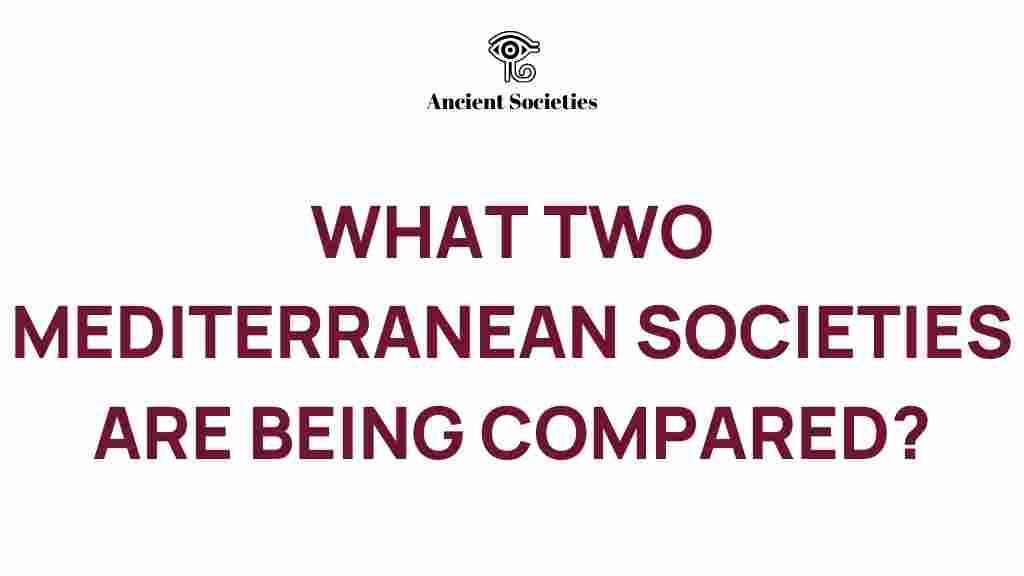Unveiling the Parallels: A Comparative Study of Two Mediterranean Societies
The Mediterranean has always been a cradle of civilization, known for its rich history and diverse cultures. This article undertakes a comparative study of two prominent Mediterranean societies: ancient Greece and ancient Rome. By exploring their cultural comparisons, societal evolution, and historical analysis, we aim to unveil the underlying parallels that define Mediterranean societies. Through this examination, we will delve into their Mediterranean heritage and how it has shaped their civilizations.
Mediterranean Societies: An Overview
Mediterranean societies have thrived for millennia, contributing significantly to the annals of human history. From the seafaring Phoenicians to the philosophical Greeks and the imperial Romans, these societies have laid the groundwork for modern civilization.
Both ancient Greece and Rome shared a geographical proximity, yet they exhibited distinct cultural identities. Nonetheless, they also demonstrated remarkable similarities that warrant a closer look.
Historical Context
To understand the cultural comparison between ancient Greece and Rome, we must first consider their historical contexts:
- Ancient Greece: Known for its city-states like Athens and Sparta, ancient Greece is celebrated for its contributions to philosophy, democracy, and the arts. Its history spans from the Minoan civilization around 2000 BCE to the Hellenistic period after the conquests of Alexander the Great.
- Ancient Rome: Emerging around the 8th century BCE, Rome began as a small settlement and grew into a vast empire that dominated the Mediterranean world. Its legacy includes law, governance, engineering, and the spread of Christianity.
Cultural Comparisons
When we perform a cultural comparison between these two Mediterranean societies, several aspects stand out:
1. Political Structures
Both societies developed unique political systems that influenced governance in the Mediterranean.
- Greece: Ancient Greece is famously known for the birth of democracy, particularly in Athens, where citizens participated directly in decision-making.
- Rome: Conversely, Rome initially had a monarchy, transitioned to a republic, and later evolved into an empire, emphasizing a more centralized power structure.
2. Religion and Mythology
Religion played a critical role in both societies, albeit with different pantheons and practices.
- Greek Mythology: The Greeks worshipped a plethora of gods and goddesses, each representing various aspects of life and nature.
- Roman Religion: The Romans adopted many Greek deities but rebranded them with Latin names and integrated them into state functions.
3. Art and Architecture
Art and architecture reflect the aesthetics and values of both societies:
- Greek Art: Renowned for its sculptures and pottery, Greek art emphasized beauty, proportion, and humanism.
- Roman Architecture: The Romans are celebrated for their engineering prowess, constructing monumental structures like aqueducts, forums, and amphitheaters.
Societal Evolution: From Ancient to Modern Times
The societal evolution of these Mediterranean societies offers insight into their lasting impact on modern civilization:
- Influence on Modern Governance: The democratic ideals of ancient Greece have shaped contemporary political systems, while Roman law forms the foundation of many legal systems worldwide.
- Philosophy and Thought: The philosophical inquiries of Greek thinkers like Socrates, Plato, and Aristotle continue to influence modern education and ethics.
- Cultural Heritage: The art, literature, and languages derived from these civilizations are integral to Western culture.
Historical Analysis of Mediterranean Societies
A historical analysis of ancient Greece and Rome reveals how these Mediterranean societies interacted and influenced each other:
Trade and Cultural Exchange
Trade routes across the Mediterranean facilitated cultural exchange and economic interdependence:
- Maritime Trade: Both societies relied heavily on maritime trade, leading to the exchange of goods, ideas, and cultural practices.
- Hellenization: The spread of Greek culture influenced Roman customs, as the Romans admired and adopted many aspects of Greek society.
Conflict and Cooperation
Despite their similarities, ancient Greece and Rome also experienced conflict:
- Punic Wars: The series of conflicts between Rome and Carthage indirectly shaped Greek political autonomy.
- Roman Conquest: Eventually, Rome conquered Greek territories, leading to a blending of cultures known as Greco-Roman civilization.
Step-by-Step Process of Analyzing Mediterranean Societies
Conducting a comparative study of Mediterranean societies involves a structured approach:
- Define Objectives: Clearly outline what aspects of the societies you wish to compare.
- Gather Historical Data: Utilize primary and secondary sources to collect relevant information about each society.
- Identify Key Themes: Focus on themes such as political structures, religion, art, and societal evolution.
- Perform Analysis: Compare and contrast the identified themes, highlighting similarities and differences.
- Draw Conclusions: Summarize your findings, emphasizing the significance of cultural comparisons in understanding Mediterranean heritage.
Troubleshooting Tips for Comparative Studies
When engaging in historical analysis, you may encounter challenges. Here are some troubleshooting tips:
- Accessing Sources: If primary sources are scarce, seek reputable secondary sources or digital archives.
- Bias in Interpretation: Be aware of potential biases in historical narratives and strive for a balanced perspective.
- Complex Comparisons: When comparing different societies, ensure that you consider the context and nuances of each culture.
Conclusion: The Legacy of Mediterranean Societies
The comparative study of ancient Greece and Rome unveils the shared heritage that defines Mediterranean societies. Through cultural comparisons in governance, religion, art, and societal evolution, we gain insight into how these civilizations shaped the modern world. Their historical legacies of democracy, philosophy, and architecture continue to influence contemporary society.
Understanding the parallels in Mediterranean heritage not only deepens our appreciation for these ancient cultures but also highlights the importance of cultural exchange and interaction in the evolution of civilization.
For further reading on Mediterranean societies, consider exploring this comprehensive resource that delves deeper into the intricacies of ancient civilizations.
Moreover, if you’re interested in an extensive collection of historical texts, visit this external link that offers a plethora of resources for a more profound understanding of Mediterranean history.
This article is in the category History and created by AncientSocieties Team
